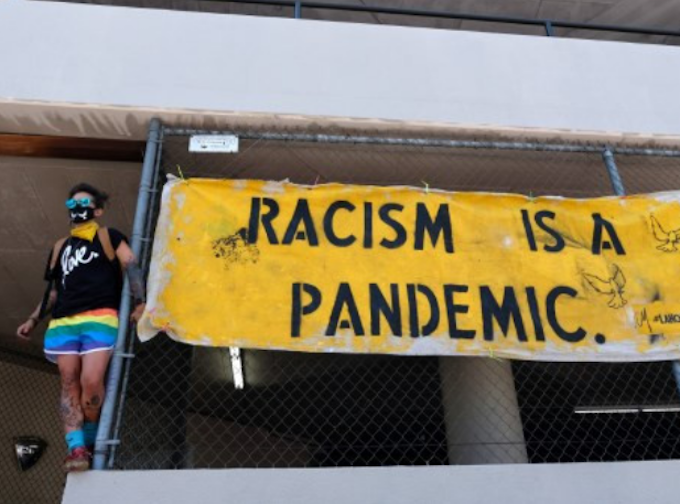By Apriza Pinandita in Jakarta
Indonesia has urged the international community to speak up and take decisive action against racial violence at a United Nations forum in Geneva, Switzerland.
But Indonesia’s call comes amid concerns of racial discrimination at home.
The UN Human Rights Council last Wednesday held an urgent debate on racial violence, the forum of which was requested by several African countries in response to the rise of racial violence, particularly in relation to the murder of African-American George Floyd that has attracted global attention and given greater prominence to the antiracism movement Black Lives Matter.
READ MORE: Jayapura police question students for holding forum protesting Papuan activists trial
According to a statement from the Indonesian Permanent Mission to the UN in Geneva, Indonesia called on the council and the Office of the High Commissioner of Human Rights to strengthen cooperation in the eradication of racial discrimination in law enforcement.
“In connection to this, Indonesia, among others, called for respect and tolerance of racial and ethnic diversity at the community level, the strengthening of the rule of law and accountability of law enforcement agencies and the expansion of human rights education in police academies and other law enforcement agencies,” the statement read.
In addition to speaking in a national capacity, Indonesia, represented by Indonesia’s permanent representative to the UN in Geneva, Hasan Kleib, was also entrusted with delivering the joint statement on behalf of the core group of the Convention Against Torture Initiative (CTI), which consists of Chile, Denmark, Fiji, Ghana, Indonesia and Morocco.
On behalf of CTI members, Indonesia called for “a zero-tolerance policy against racism and discrimination and reiterated the importance of a people-centered and violence prevention approach in law enforcement”.
Tainted by racism at home
However, Indonesia’s vocal stance on the global stage is tainted by persistent issues of racism at home.
As the Black Lives Matter movement began to go global, Indonesians flooded public forums with the hashtag #PapuanLivesMatter, drawing attention to several controversial cases of alleged racial discrimination, including the prosecution of the Balikpapan Seven — a group of Papuan student activists put on trial for their involvement in a series of antiracism protests in Jayapura, Papua, in 2019.
The protests came in response to a racially charged incident in which Papuan university students living in a dormitory in Surabaya, East Java, were targeted last August in what became widely known as the Papuan Uprising.
Reports said the students were physically and verbally attacked by security personnel and members of local mass organisations, who accused them of refusing to celebrate Indonesia’s 74th Independence Day.
Despite arguments that the seven students — Buchtar Tabuni, Ferry Kombo, Irwanus Uropmabin, Hengki Hilapok, Agus Kossay and Stevanus Itlay — staged the protests in a peaceful manner, a court in East Kalimantan found them guilty of treason.
Ironically, the issuance of the verdict coincided with the Geneva forum, during which Jakarta, in its national capacity, also delivered a statement expressing concern about the acts of violence and discrimination in many parts of the world, particularly due to the rise of racial violence and hate crimes.
The Balikpapan District Court in East Kalimantan sentenced the students to months in jail last Wednesday.
Demands for acquittal
Members of public, human rights advocates and activists had demanded the defendants be cleared of all charges, while prosecutors sought sentences of up to 17 years’ imprisonment.
Contacted by The Jakarta Post for comment, Foreign Ministry spokesman Teuku Faizasyah said that “as a matter of principle, Indonesia is against any form of racism and discrimination.
“In the national context, racism is an aberration to our motto of unity and diversity, as Indonesia is a mosaic of multiple ethnicities and cultures.”
The decision by the lower court in Balikpapan was made with due diligence, he added.
“The incident of mistreatment of Indonesians of Papuan origin are isolated and do not in any way reflect the policies of the government,” Faizasyah told Reuters recently.

Article by AsiaPacificReport.nz





